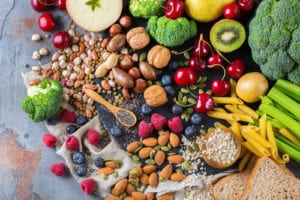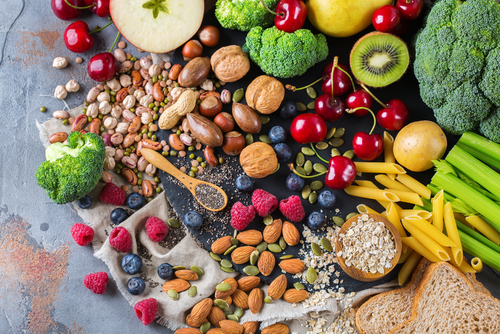Although plants contain nearly all the essentials we need in terms of nutrition, we can run into health issues if we do not consume a wide enough variety of foods from the various food groups. With variety and the inclusion of supplements or fortified foods, we can meet all our nutritional requirements without the use of animal products.
The main nutritional concerns are outlined below; with included sources to look for to make sure you are getting enough nutrients that your body needs.
Deficiency Concerns With Vegan Diets
Protein
One of the first questions you may be asked if you tell someone you are vegetarian, or vegan, is: “Where do you get your protein?” It is a common misconception that only animal products such as meat, cheese, eggs and dairy contain protein. Nearly all plant foods contain protein to varying degrees. Some of the best sources include: grains, legumes, beans, nuts, and seeds. Some sources like quinoa, wheat, oatmeal, brown rice, peas, lentils, black beans, chick peas, tofu(soy), and imitation meats contain adequate quantities of protein when combined to make complete meals.
Vitamin B12
Vitamin B12 is found in animal products and sometimes contaminated plant products, however plants and animals cannot produce vitamin B12. Vitamin B12 is produced only by bacteria, fungi, and algae. Vitamin B12 can be produced in the intestinal tracts of animals by the bacteria present, but it cannot be absorbed. Vitamin B12 can be obtained using supplementation and inclusion of fortified foods in vegan diets. Some examples of fortified foods include: soy and non-dairy beverages, cereals, and nutritional yeast.
Calcium
The primary sources of calcium, in most diets, are dairy products such as milk, cheese, and yogurt. Since vegans do not consume these products, they need to look for other sources. Sources of calcium include: tofu (processed with calcium), green vegetables (such as broccoli, kale, and bok choy), legumes, and fortified foods. Some fortified foods include: non-dairy beverages, grain products, and orange juice.
Vitamin D
Exposure to sunlight is all our bodies need to produce vitamin D. At certain times of the year such as winter, or if you cannot get adequate sun exposure for various reasons, you may need to take in supplemental vitamin D or consume fortified foods. Some common foods fortified with vitamin D include: soy, orange juice, and some breakfast cereals.
Iron
Iron is present in both animal and plant products, with the main forms being heme iron from animals (well absorbed) and nonheme iron from plants (poorly absorbed). Iron can be obtained from a vegan diet through the inclusion of spinach and lentils; two of the highest sources out of both plant and animal products. Iron can also be obtained through including legumes, tofu, and dark leafy green vegetables into your diet. Iron is also present in iron-fortified foods such as cereals and breads.
Zinc
Although zinc is found in both plant and animal products, plants contain phytates which can interfere with the absorption of zinc. Zinc can be obtained by eating whole grains, legumes, nuts, meat substitutes and tofu.
Omega 3
Most animal products contain EPA and DHA, which are essential fatty acids that cannot be produced by the human body. Plants contain linoleic acid and alpha-linoleic acid which are both essential fatty acids. Linoleic acid and alpha-linoleic acid can be converted in the human body to EPA and DHA, which means that even if you do not consume animal products you can still get enough omega 3’s and omega 6’s as well. One of the best sources of omega 3’s is flaxseed or flaxseed oil. Other sources include: walnuts, seaweed, and even DHA rich microalgae.
Even though the above nutrients pose health concerns if we do not consume animal products, we can consume enough plant products to meet our needs with the occasional use of supplements and/or regular use of fortified foods. The key is to consume enough variety as well as adequate quantity in terms of caloric needs to be balanced.

Source: Smolin, Lori A, Mary B. Grosvenor, and Debbie Gurfinkel. Nutrition: Science and Applications, 2nd Canadian Edition. Toronto, ON:Wiley. 2015. Print.


